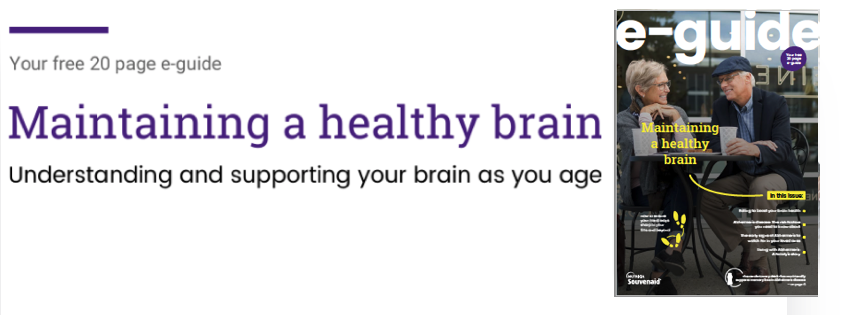
Ageing is inevitable, but just as there are many ways to keep your body in tip-top shape as you get older, your brain can benefit from some special treatment too.
Research has linked several foods with staving off cognitive decline, and even slowing the rate of decline in people diagnosed with Alzheimer’s and mild cognitive impairment.
The Harvard Medical School’s health website, for example, says foods rich in omega-3 fatty acids, B vitamins and antioxidants contribute to better brain health.Some of the big providers of omega-3 fatty acids are fish such as salmon, cod or tuna, which contain unsaturated fats that can lower blood levels of proteins that form lumps in the brain – lumps that are thought by some researchers to cause Alzheimer’s disease. The medical school recommends eating fatty fish twice a week to maintain strong cognitive function.
Harvard also says walnuts have a kind of omega-3 fatty acid that has been linked to improved brain health scores, while other research has found that consuming nuts on a regular basis can strengthen brainwave frequencies linked with memory, learning, healing and cognitive functions.
Studies by Rush University Medical Centre, meanwhile, found that eating one serve of leafy green vegetables a day can be an effective way of promoting brain health.
Study participants who ate the most leafy green vegetables showed a slower rate of decline when it came to memory and thinking skills, compared to those who ate fewer leafy greens. A serve a day has the potential to slow the brain ageing process by 11 years, the researchers found.
Another well-known food-based method of maintaining brain health is the so-called Mediterranean diet, which is rich in fruits, vegetables, olive oil, beans, wheat and rice and limited in red meats and poultry.
“A Mediterranean diet from early adult life onwards has been associated with a decrease of overall dementia,” Associate Professor David Darby, a behavioural neurologist at Melbourne Cognitive Services, explains.Research by the American Academy of Neurology found that people aged between 73-76 who followed a Mediterranean diet over three years retained more brain volume than people who didn’t follow the diet.
While these dietary habits have been linked to decreasing the risk of cognitive decline, further studies have found that people already showing symptoms of cognitive decline, particularly in cases of Alzheimer’s disease, can slow the rate of decline with specific nutrients.
Results from the LipiDidiet study – the first clinical trial to investigate the effects of a medicinal food in patients with early Alzheimer’s disease – found that medical nutrition drink Souvenaid® improved everyday thinking and functional ability and memory performance in the people who drank it every day for two years.
That’s because people with Alzheimer’s are typically lacking the right levels of omega 3 fatty acids, uridine monophosphate, choline and B-vitamins, which are essential in maintaining nerve cell junctions called synapses that help deliver electrical and chemical messages to different parts of the brain.
A 125-millilitre bottle of Souvenaid® – which provides the same nutrients as eating eight tins of tuna, 1 kilogram of tomatoes, 100 grams of minced beef, four eggs, 1.2kg of broccoli, 710g of spinach, one orange and a handful of Brazil nuts each day – helped to bring the nutrient levels in the Alzheimer’s patients to the normal levels, something that would’ve been near-impossible to do by consuming food due to the quantities involved.
“The bottle contains a concentrate of really, effectively, a Mediterranean diet,” Prof Darby says of Souvenaid®. “It has fish oil and things like choline and various vitamins and UMP (uridine monoposphate). All of these things are important if you’re going to make new membranes in the brain.
“If you just take fish oil, for example, you’re not going to have the other chemicals which are needed to help the fish oil be incorporated into membranes. It’s turned out that fish oil doesn’t seem to work by itself in other trials, but Souvenaid® does work.”
The LipiDiDiet study confirmed Souvenaid® was the only product available so far to offer the key nutrients in the right combination and at the right levels to support synapse function. But researchers are continuing to investigate whether other diets can slow or even reverse memory loss or cognitive impairment.
For example, University Health News notes that a ketogenic diet – high-fat, adequate-protein and low-carbohydrate – produces compounds in the body called ketones that typically produce energy but have also been found to be “neuroprotective” in that they help the brain ward off the damage that’s commonly linked to mild cognitive impairment and dementia, including Alzheimer’s disease.
Souvenaid® is a Food for Special Medical Purposes for the dietary management of the early stages of Alzheimer’s disease. Souvenaid® must be used under medical supervision. You must seek advice from your doctor, nurse or pharmacist if you are unsure of your condition or diagnosis or if you would like to use Souvenaid®.
IMPORTANT LEGAL INFO This article is of a general nature and FYI only, because it doesn’t take into account your personal health requirements or existing medical conditions. That means it’s not personalised health advice and shouldn’t be relied upon as if it is. Before making a health-related decision, you should work out if the info is appropriate for your situation and get professional medical advice.

Souvenaid® nutritionally supports memory loss in the early stages of Alzheimer's disease (must be used under medical supervision).
If you are concerned about your cognitive health, please see your Healthcare Professional.